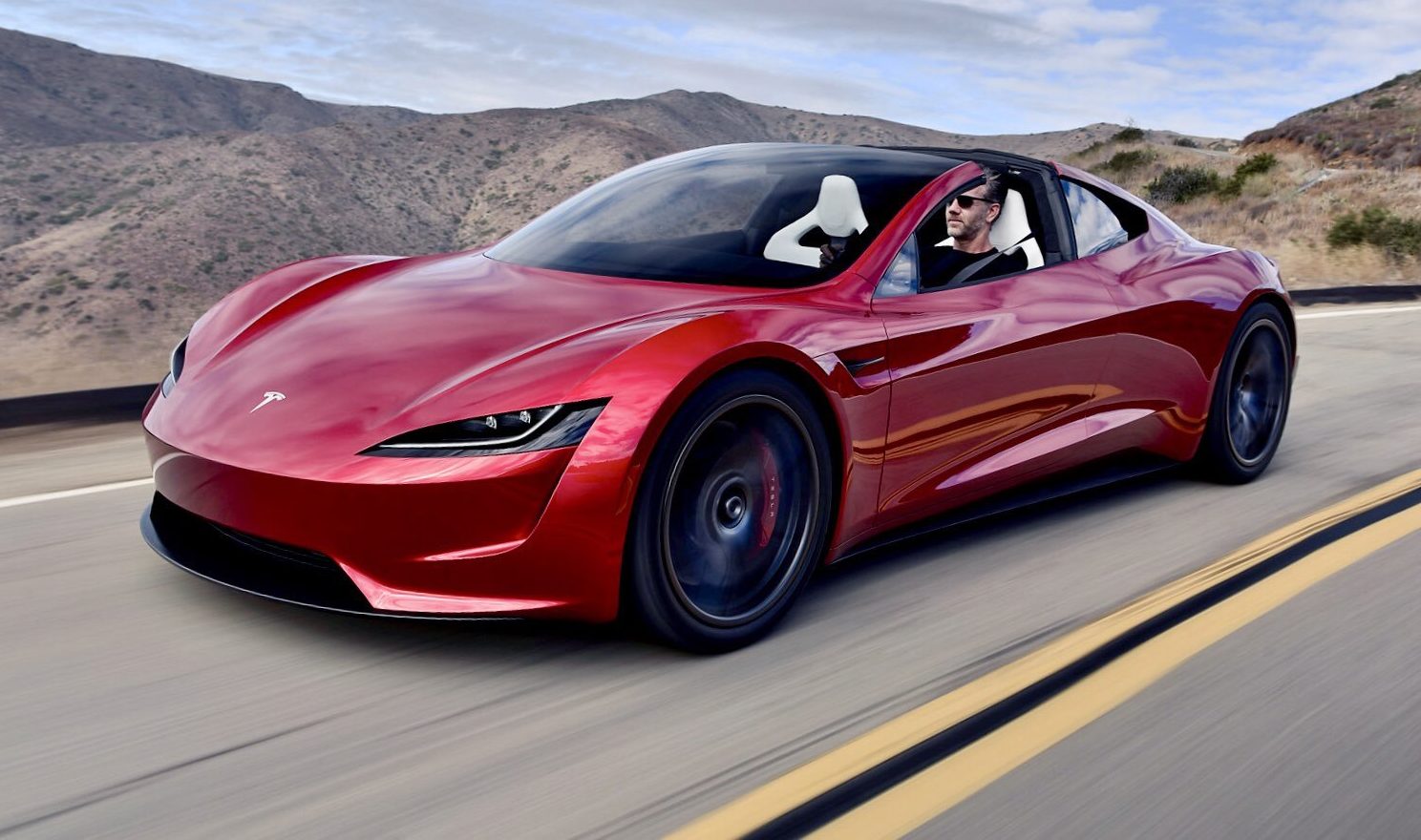
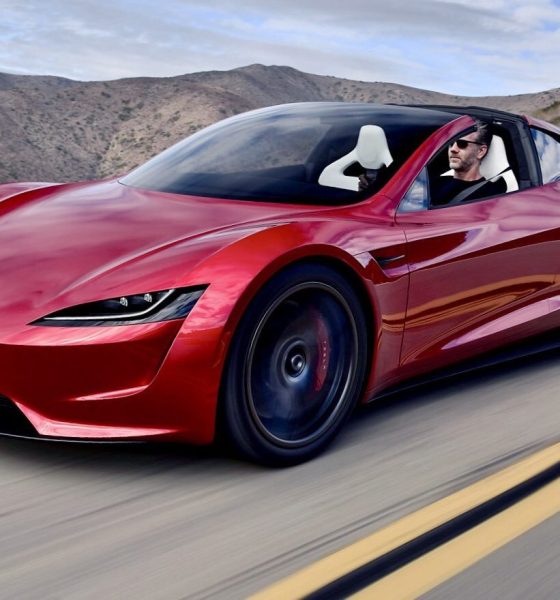
News
Tesla’s next-gen Roadster is ushering in the automotive industry’s ‘Megacar’ era
Elon Musk is a man driven by his limits. The man behind electric car maker Tesla, Musk has led the company from its small Silicon Valley startup days to its current status as a $50 billion automaker with a market cap that rivals that of Ford and GM. With each vehicle that Musk releases, Tesla disrupts an industry, and with the next-generation Roadster, the CEO is aiming to create a true halo car.
Christian von Koenigsegg is a man driven by his passion. The man behind the small, exclusive supercar company Koenigsegg, Christian is known for pushing the limits of the vehicles he releases. Koenigsegg might be far smaller than supercar makers like Ferrari and Lamborghini, but the few cars that it makes shake the automotive world. The Koenigsegg Agera RS, for one, currently holds the title as one of the fastest cars in the world after it reached speeds of 278 mph. The Koenigsegg One:1, named for its equal power-to-weight ratio, also packs 1,341 horsepower, or the equivalent of one megawatt of power. Koenigsegg’s cars are so powerful that some of them actually qualify as a hypercar instead of a supercar.
When Christian von Koenigsegg heard the specs of Tesla’s next-generation Roadster, his entire company’s roadmap for the coming years was shaken. In a recent statement to Top Gear, Koenigsegg admitted that his company was completely thrown off course by the listed specs of the all-electric supercar, even admitting that the experience itself was “frustrating.”
“We kind of had our future mapped out, and then we heard about the new Tesla Roadster and its insane acceleration numbers, and we thought ‘damn that’s put the gauntlet down.’ Sure, it must be really heavy, but that kind of acceleration? That’s frustrating!” he said.
https://www.instagram.com/p/BnDT8v1hKJH/?tagged=teslaroadster
Christian noted that one of the biggest revelations by the arrival of the next-generation Tesla Roadster was that Elon Musk’s quoted specs for the vehicle were actually possible. In order to respond to the arrival of an electric car designed to deliver a “hardcore smackdown” to gas-powered vehicles, Koenigsegg and his engineers came up with a strategy that would allow one of its cars to give the Roadster some good competition.
“We thought, ‘this is not OK.’ We wondered whether it was possible, and yeah, it’s possible. Then we thought, ‘OK how do we deal with it? This is embarrassing.’ In two days we’d thought of a few things. The simplest way of putting it is like this: it’s combining direct drive, with the hybridization we have in a different format with free-valve engine technology, in a peculiar layout,” he said.
The concept that Koenigsegg and his team came up with is pretty much the fossil fuel-powered counterpart of the next-generation Tesla Roadster — one that is beyond a hypercar, perhaps even a “megacar” of sorts. Christian noted that he was partly annoyed at himself, for “needing a kick in the head to start thinking” about improving his vehicles’ acceleration.
“We’re talking 0-250 mph in 14 seconds, or something like this. It’s like, black marks all the way up to 250 mph (400 kph), pushing the combustion engine into the wall to try to make it more power dense than an EV for as long as possible. What we see with our engines, we’ve noticed that we’re just scratching the surface of what we can achieve,” he said.
https://www.instagram.com/p/BnHiOO4FYQv/?taken-by=koenigseggnewportbeach
Elon Musk threw the gauntlet at legacy automakers when he unveiled the next-generation Tesla Roadster last year, and if Christian von Koenigsegg’s reaction to the vehicle is any indication, it appears that the all-electric supercar is doing precisely what it was intended for — it is forcing automakers to see electric cars as a formidable force, and it is driving them to adapt and come up with ways to make their vehicles even better and faster.
Interestingly, such a sentiment has been echoed by Tesla’s test driver for the next-generation Roadster, Emile Bouret, earlier this year. In a segment with YouTube’s VINwiki channel, Bouret, who drove the all-electric car the whole night during its unveiling, encouraged the auto community to support projects and vehicles like the next-generation Roadster, stating that the existence of such vehicles would affect the auto industry in a positive way as a whole.
“I love that I live in a world where all these cars exist. You have Koenigseggs and Paganis and Ferraris and Lamborghinis and McLarens and Porsches and Rimacs and Teslas. So, I know there’s a lot of hate out there, but I just don’t understand it. If you’re a car person, wouldn’t you root for everybody? I’m definitely rooting for them because the world will be a better place if that car does get built and it gets on the road because other people are gonna build cars to beat it — and we’re gonna win,” he said.
Considering that Koenigsegg appears to have come up with a solution to match the next-gen Roadster, it seems that Buoret’s words are coming true. As the Tesla Roadster and Koenigsegg’s upcoming vehicle are released to the market, the era of megacars could very well begin.

Cybertruck
Tesla Cybertruck’s newest trim will undergo massive change in ten days, Musk says
It appears as if the new All-Wheel-Drive trim of Cybertruck won’t be around for too long, however. Elon Musk revealed this morning that it will be around “only for the next 10 days.”
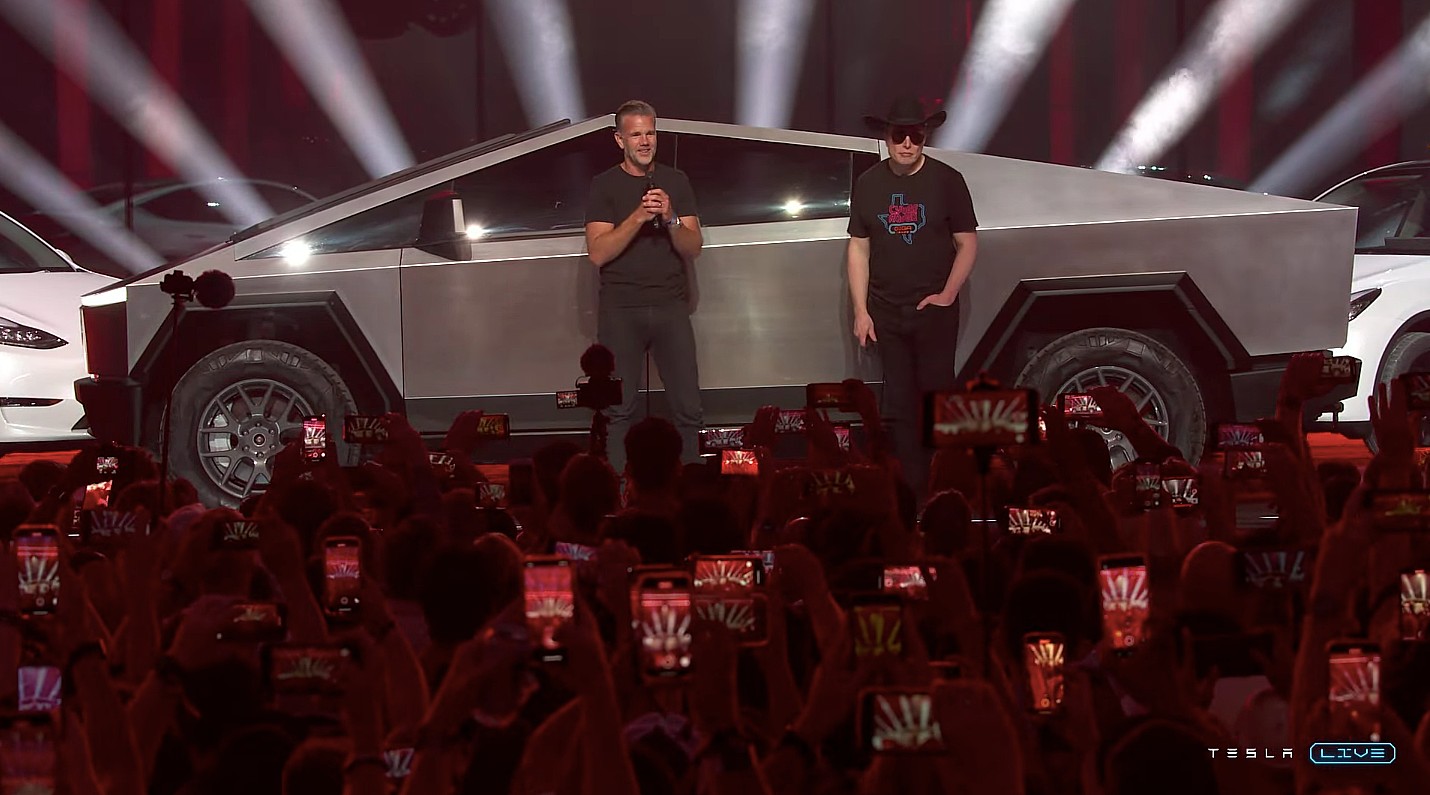
Tesla’s new Cybertruck trim has already gotten the axe from CEO Elon Musk, who said the All-Wheel-Drive configuration of the all-electric pickup will only be available “for the next ten days.”
Musk could mean the price, which is $59,990, or the availability of the trim altogether.
Last night, Tesla launched the All-Wheel-Drive configuration of the Cybertruck, a pickup that comes in at less than $60,000 and features a competitive range and features that are not far off from the offerings of the premium trim.
Tesla launches new Cybertruck trim with more features than ever for a low price
It was a nice surprise from Tesla, considering that last year, it offered a Rear-Wheel-Drive trim of the Cybertruck that only lasted a few months. It had extremely underwhelming demand because it was only $10,000 cheaper than the next trim level up, and it was missing a significant number of premium features.
Simply put, it was not worth the money. Tesla killed the RWD Cybertruck just a few months after offering it.
With the news that Tesla was offering this All-Wheel-Drive configuration of the Cybertruck, many fans and consumers were encouraged. The Cybertruck has been an underwhelming seller, and this seemed to be a lot of truck for the price when looking at its features:
- Dual Motor AWD w/ est. 325 mi of range
- Powered tonneau cover
- Bed outlets (2x 120V + 1x 240V) & Powershare capability
- Coil springs w/ adaptive damping
- Heated first-row seats w/ textile material that is easy to clean
- Steer-by-wire & Four Wheel Steering
- 6’ x 4’ composite bed
- Towing capacity of up to 7,500 lbs
- Powered frunk
It appears as if this trim of Cybertruck won’t be around for too long, however. Musk revealed this morning that it will be around “only for the next 10 days.”
Only for the next 10 days https://t.co/82JnvZQGh2
— Elon Musk (@elonmusk) February 20, 2026
Musk could mean the price of the truck and not necessarily the ability to order it. However, most are taking it as a cancellation.
If it is, in fact, a short-term availability decision, it is baffling, especially as Tesla fans and analysts claim that metrics like quarterly deliveries are no longer important. This seems like a way to boost sales short-term, and if so many people are encouraged about this offering, why would it be kept around for such a short period of time?
Some are even considering the potential that Tesla axes the Cybertruck program as a whole. Although Musk said during the recent Q4 Earnings Call that Cybertruck would still be produced, the end of the Model S and Model X programs indicates Tesla might be prepared to do away with any low-volume vehicles that do not contribute to the company’s future visions of autonomy.
The decision to axe the car just ten days after making it available seems like a true head-scratcher.
Elon Musk
Elon Musk’s Neuralink sparks BCI race in China
One of the most prominent is NeuroXess, which launched in 2021 and is already testing implants in patients.
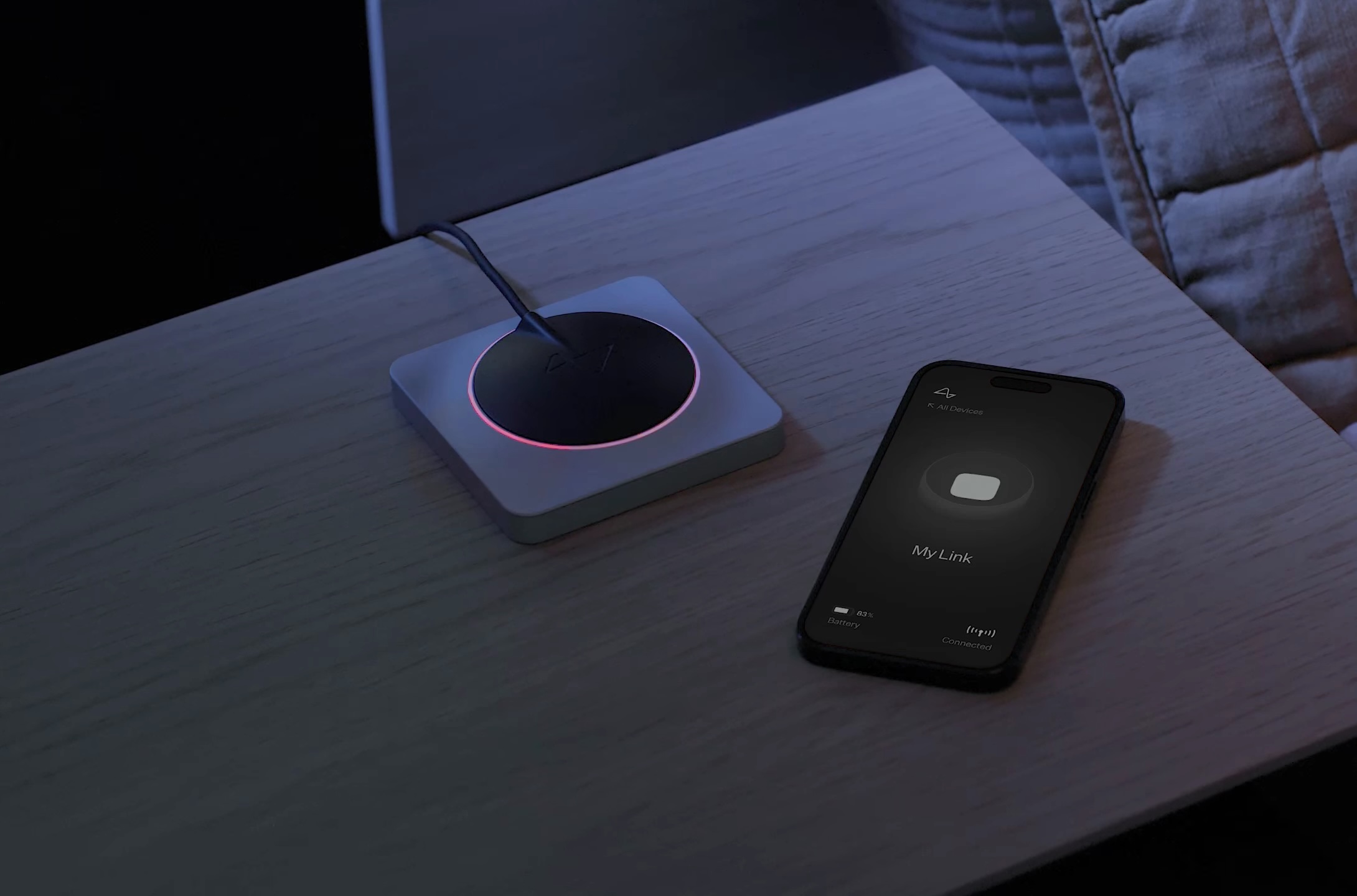
Neuralink, founded by Elon Musk, is helping spark a surge of brain-computer interface (BCI) development in China, where startups are moving quickly into human trials with strong state backing.
One of the most prominent is NeuroXess, which launched in 2021 and is already testing implants in patients.
Neuralink’s clinical work and public demonstrations have drawn worldwide attention to invasive brain implants that allow patients to control digital devices using their minds. The company is currently running a global clinical trial and is also busy preparing for its next product, Blindsight, which would restore vision to people with visual impairments.
Neuralink’s visibility has helped accelerate similar efforts in China. Beijing last year classified brain-computer interfaces as a strategic sector and issued a roadmap calling for two or three globally competitive companies by 2030, as per the Financial Times. Since February last year, at least 10 clinical trials for invasive brain chips have launched in the country.
NeuroXess recently reported that a paralyzed patient was able to control a computer cursor within five days of implantation. Founder Tiger Tao credited government support for helping shorten the path from research to trials.
Investment activity has followed the policy push. Industry data show dozens of financing rounds for Chinese BCI startups over the past year, reflecting rising capital interest in the field. Ultimately, while Neuralink remains one of the most closely watched players globally, its momentum has clearly energized competitors abroad.
News
Tesla Supercharger vandalized with frozen cables and anti-Musk imagery amid Sweden union dispute
The incident comes amid Tesla’s ongoing labor dispute with IF Metall.
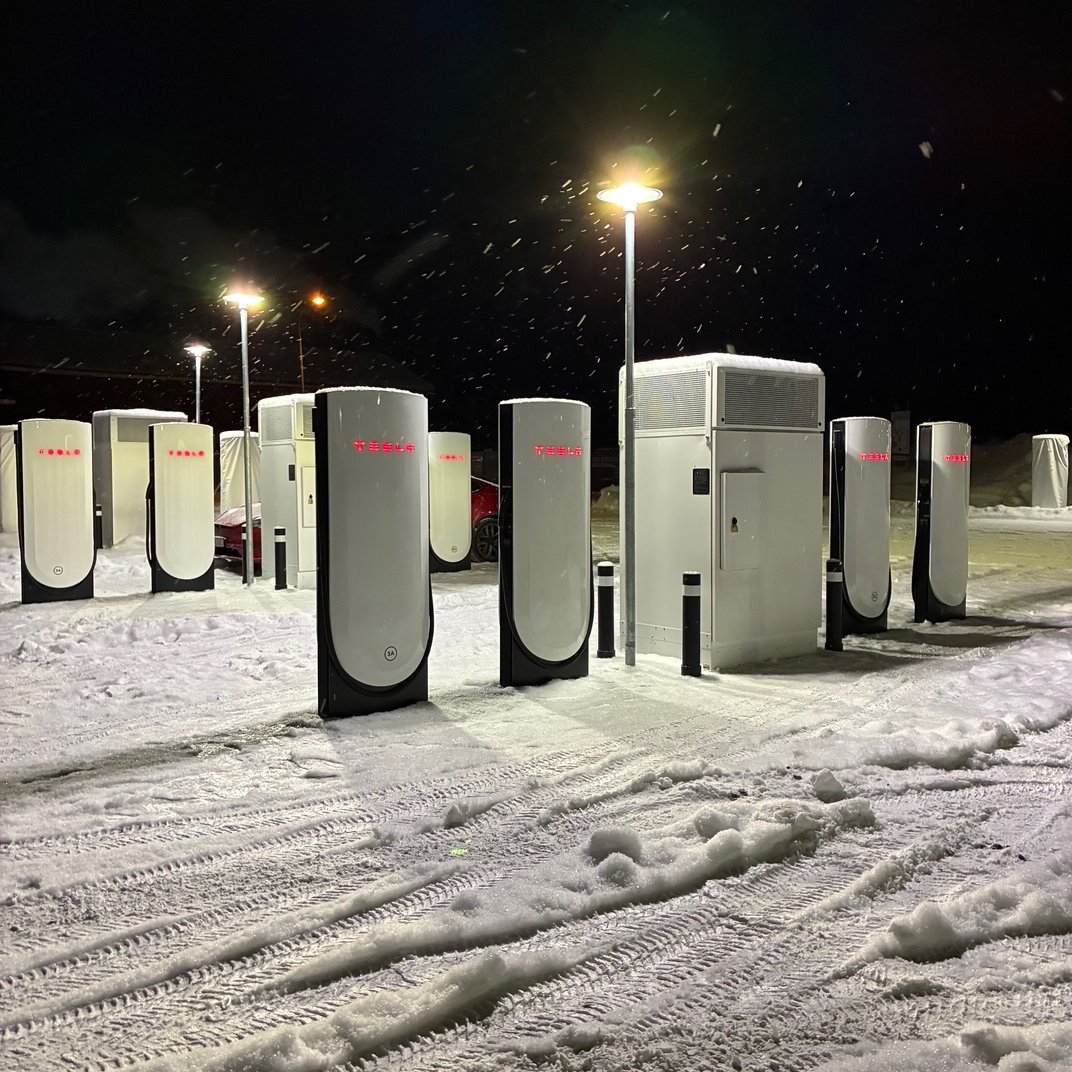
Tesla’s Supercharger site in Vansbro, Sweden, was vandalized during peak winter travel weeks. Images shared to local media showed frozen charging cables and a banner reading “Go home Elon,” which was complete with a graphic of Musk’s controversial gesture.
The incident comes amid Tesla’s ongoing labor dispute with IF Metall, which has been striking against the company for more than two years over collective bargaining agreements, as noted in a report from Expressen.
Local resident Stefan Jakobsson said he arrived at the Vansbro charging station to find a board criticizing Elon Musk and accusing Tesla of strikebreaking. He also found the charging cables frozen after someone seemingly poured water over them.
“I laughed a little and it was pretty nicely drawn. But it was a bit unnecessary,” Jakobsson said. “They don’t have to do vandalism because they’re angry at Elon Musk.”
The site has seen heavy traffic during Sweden’s winter sports holidays, with travelers heading toward Sälen and other mountain destinations. Jakobsson said long lines formed last weekend, with roughly 50 Teslas and other EVs waiting to charge.
Tesla Superchargers in Sweden are typically open to other electric vehicle brands, making them a reliable option for all EV owners.
Tesla installed a generator at the location after sympathy strikes from other unions disrupted power supply to some stations. The generator itself was reportedly not working on the morning of the incident, though it is unclear whether that was connected to the protest.
The dispute between Tesla and IF Metall centers on the company’s refusal to sign a collective agreement covering Swedish workers. The strike has drawn support from other unions, including Seko, which has taken steps affecting electricity supply to certain Tesla facilities. Tesla Sweden, for its part, has insisted that its workers are already fairly compensated and it does not need a collective agreement,
Jesper Pettersson, press spokesperson for IF Metall, criticized Tesla’s use of generators to keep charging stations running. Still, IF Metall emphasized that it strongly distances itself from the vandalism incident at the Vansbro Supercharger.
“We think it is remarkable that instead of taking the easy route and signing a collective agreement for our members, they are choosing to use every possible means to get around the strike,” Pettersson said.








